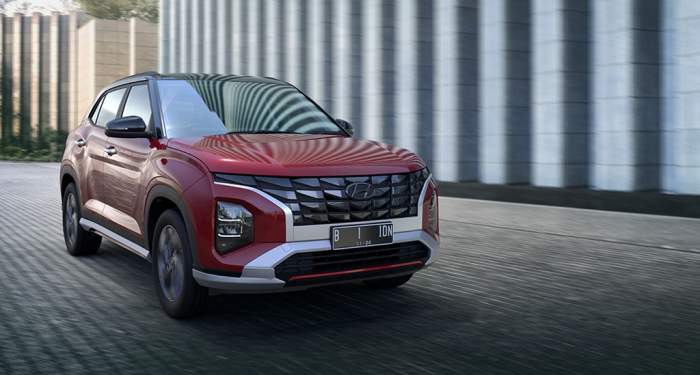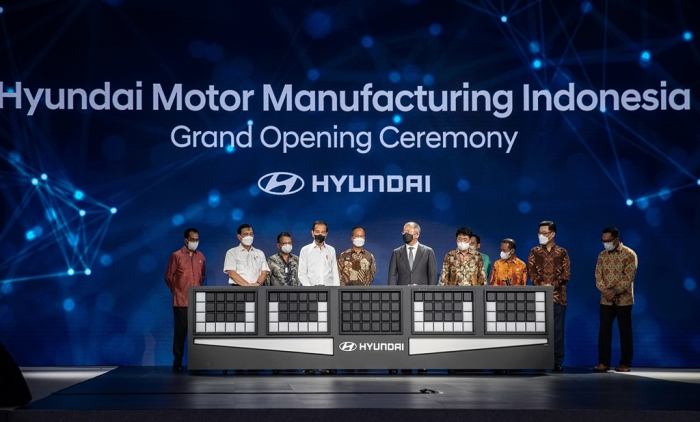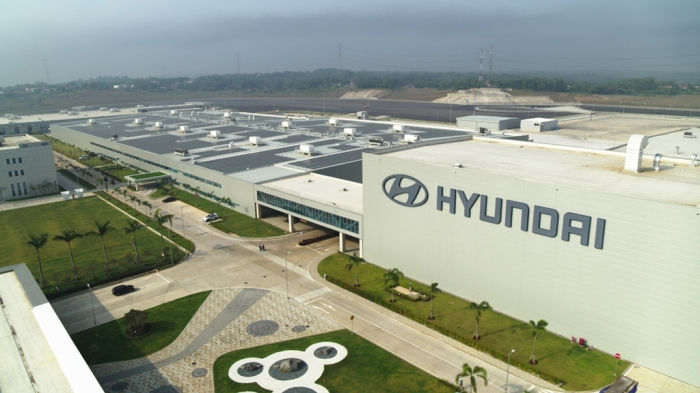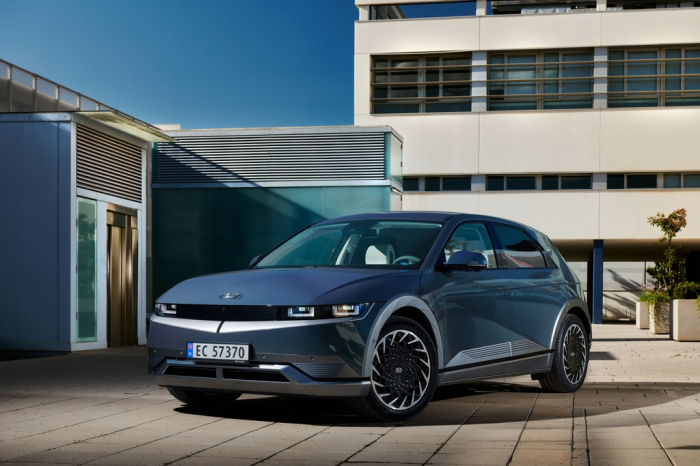Automobiles
Hyundai, Kia vow to crack Japan-dominated SE Asian market with EVs
The duo plan to launch stylish EVs to challenge Japanese dominance and rival budget Chinese cars
By Jan 21, 2023 (Gmt+09:00)
4
Min read
Most Read
LG Chem to sell water filter business to Glenwood PE for $692 million


Kyobo Life poised to buy Japan’s SBI Group-owned savings bank


KT&G eyes overseas M&A after rejecting activist fund's offer


StockX in merger talks with Naver’s online reseller Kream


Mirae Asset to be named Korea Post’s core real estate fund operator



For more than four decades, Japanese automakers, led by Toyota Motor Corp., have reigned as undisputed champions in the Southeast Asian auto market with their names on nine of every 10 passenger cars sold.
Alongside Chinese carmakers armed with budget vehicles, South Korea’s two largest automakers – Hyundai Motor Co. and sister firm Kia Corp. – are now poised to launch a series of stylish electric cars in Southeast Asia to challenge the Japanese dominance.
While well-known bulky US and European brands are still relatively insignificant, competition is particularly fierce among Japan, Korea and China against local rivals to gain ground in the market.
Generous state subsidies and tax incentives from several Southeast Asian governments eager to put more EVs on their roads is all the more appealing, analysts said.
“Countries such as Indonesia and Vietnam have a high proportion of young people in their 20s and 30s, who are versed in K-pop and Korean culture. That’s a strength for Korean carmakers,” said an industry official.
Chinese carmakers are also expected to launch aggressive marketing efforts by releasing low-cost EVs, targeting consumers in the middle-income bracket.

INDONESIA, HYUNDAI’S SE ASIAN HUB
In Indonesia, Southeast Asia’s top car-selling market with 1.05 million units sold last year, Hyundai and Kia accounted for a 3.2% market share with 34,051 vehicles. That’s a significant improvement from a mere 0.6% share with 5,713 cars sold in the previous year.
Still, Korean carmakers have some catching up to do.
Japan’s Toyota controlled 31.6% of the Indonesian market in 2022, followed by Daihatsu Motor Co. at 18.3%, Mitsubishi Motors Corp. at 13.1% and Honda Motor Co. at 12.5%.
The Korean duo attributed their meaningful improvement to the kickoff of Hyundai’s Indonesian manufacturing plant last year.
In May, Hyundai began mass producing its iconic all-electric crossover IONIQ 5 at its newly built plant in the Deltamas industrial complex in Bekasi Regency, about 40 km east of Jakarta.
Hyundai said at the time it would spend $1.55 billion to increase its annual production capacity to 150,000 units by the end of 2022, and further expand to 250,000 cars in the long run.
“Indonesia is Hyundai Motor’s core base for its future mobility strategy in Southeast Asia,” Hyundai Motor Chairman Chung Euisun said at the plant opening ceremony, which was joined by Indonesian President Joko Widodo.
Vehicles made at the plant are sold in Indonesia and exported to neighboring countries, targeting the Association of Southeast Asian Nations (ASEAN) market.
Indonesia also has ample mineral resources such as nickel and cobalt, key raw materials for EV battery production. The Southeast Asian country is the world’s top nickel producer with the largest reserves.

In Vietnam, Hyundai and Kia overtook Toyota in 2019.
Last year, the Korean duo ranked top in the 420,000-new vehicle Vietnamese market with a combined share of 30.7%, followed by Toyota (21.8%), Mitsubishi (9.5%), Mazda (8.6%) and Honda (7.3%).
Meanwhile, Chinese carmakers are eager to penetrate the Vietnamese and Thai markets.
China’s BYD Co. plans to break ground on an EV parts factory in Vietnam by the end of this year.
In Thailand, BYD is building an electric vehicle manufacturing plant with an annual capacity of 150,000 units. The plant is expected to begin mass production in 2024.
Wuling Motors Corp., a joint venture between China’s SAIC Motor Corp. and General Motors Co., is already selling low-cost EVs in Thailand and other Southeast Asian countries where their governments will ban sales of internal combustion engine models from 2050.
Japan’s Honda plans to build electric SUVs in Thailand sometime this year.

HUGE GROWTH POTENTIAL
Hyundai and Kia have focused on Southeast Asia, given the strong growth potential in the region.
In Indonesia, the world’s fourth most populous country, the ratio of car ownership to the total population stands at fewer than 100 cars per 1,000 people.
India, the world’s third-largest car market after China and the US, is also emerging as one of Hyundai Motor Group’s core Asian markets.
Hyundai and Kia have emerged as preferred SUV brands in India, with one in every two SUVs sold made by the Korean duo in 2020.
Last year, Hyundai Motor’s mid-size SUV Creta was the top-selling SUV and the seventh-highest seller among all vehicles in India, which has a population of 1.4 billion people.
Hyundai and Kia sold a combined 807,067 vehicles in India last year, representing their best performance since Hyundai established its car manufacturing plant in Chennai in 1998.
In a year-end organizational revamp last December, Hyundai Motor Group established its ASEAN regional headquarters separately from its existing Asia-Pacific regional headquarters.
“Electric cars will lead us to become the top car seller in the ASEAN market,” said Hyundai Motor Chief Executive Chang Jae-hoon.
Write to Hyung-Kyu Kim at khk@hankyung.com
In-Soo Nam edited this article.
More to Read
-
 AutomobilesHyundai, Kia post record sales in India; to build IONIQ 5 locally
AutomobilesHyundai, Kia post record sales in India; to build IONIQ 5 locallyJan 10, 2023 (Gmt+09:00)
4 Min read -
 Future mobilityHyundai Motor, Indonesia to jointly enter ASEAN air mobility market
Future mobilityHyundai Motor, Indonesia to jointly enter ASEAN air mobility marketNov 14, 2022 (Gmt+09:00)
2 Min read -
 BatteriesHyundai Motor, LG Energy secure $710 mn for battery JV in Indonesia
BatteriesHyundai Motor, LG Energy secure $710 mn for battery JV in IndonesiaAug 22, 2022 (Gmt+09:00)
2 Min read -
 Business & PoliticsIndonesian president to visit Hyundai Motor during Korea visit
Business & PoliticsIndonesian president to visit Hyundai Motor during Korea visitJul 26, 2022 (Gmt+09:00)
3 Min read
Comment 0
LOG IN


